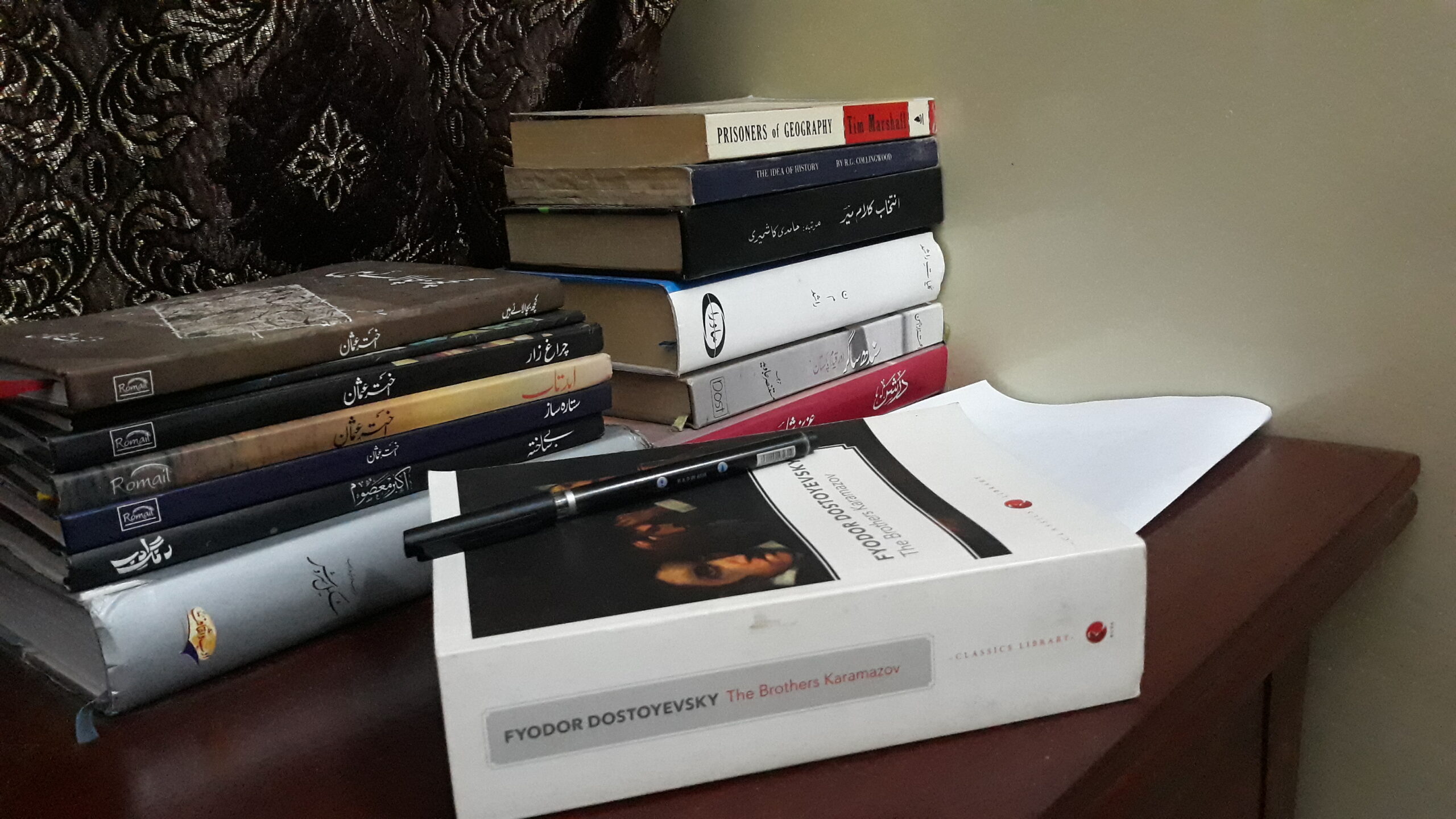The Brothers Karamazov by Fyodor Dostoevsky ایک ناول نہیں، سفر ہے. ایک بےرحم باپ اور اس کے تین بیٹوں کی آپسی چپقلش سے شروع ہوتا ہوا یہ سفر انسانی نفسیات کی گتھیوں کو سلجھا تا ہوا خدا کے وجود، مذہب کی ضرورت اور اخلاقیات کے مروجہ معیارات کی بحث تک پہنچ جاتا ہے.
اس میں کوئی شک نہیں کہ یہ ایک بہت طویل سفر ہے اور نوواردانِ علم بیچ راستے میں ہی ہانپ ہانپ جاتے ہیں، لیکن ناول کا موضوع اور دوستووسکی کا قلم سمندر کو کوزے میں بند کرنے کی بجائے متجسس ذہنوں کو وسعتِ صحرا عطا کرنے کا متقاضی ہے.
ایک بے رحم باپ کرامازوف ہے، جس پر الزام ہے کہ اُس نے اپنے بیٹے کے حصہ کی جائیداد ہڑپ تو کر ہی لی ہے، اب اسی بیٹے کی محبوبہ پر بھی رالیں ٹپکا رہا ہے.
اس کا بڑا بیٹا مٹیا، باپ نے جس پر کبھی شفقت کی نظر نہیں کی، جو نوکروں کے ہاتھ پلتا رہا، جو قلاش ہے، مشتعل مزاج اور شرابی کبابی ہے اور اپنی فاقہ مستی کے ایک دن رنگ لانے کا منتظر ہے. ایک قتالہ سے اس کی منگنی ہو چکی ہے مگر ایک فاحشہ کی زلفوں کا وہ اسیر ہے. دوستووسکی مٹیا کے بارے کہتا ہے کہ He was unmistakably a man driven into a corner, on the brink of ruin, catching at the last straw, ready to sink if he failed
دوسرا بیٹا اوان ملحد ہے، جرأتِ کفر اور ہمتِ تحقیق پر یقین رکھتا ہے. خدا اور مذہب کو غیر ضروری قرار دیتا ہے، اپنے بڑے بھائی کی منگیتر اور سابقہ محبوبہ کیٹیا کو دل دے بیٹھا ہے.
تیسرا بیٹا خانقاہ سے تربیت یافتہ ایک سادھو ہے. مذہب اور خدا پر بہت گہرا اعتقاد رکھتا ہے. سادھو زوسیما کا وہ خاص شاگرد ہے اور ان سے بہت متاثر ہے. حلیم الطبع، سب کا محبوب اور سب کا محب. ناول پڑھنے کے بعد کون ہے جو الیوشا کی محبت میں مبتلا نہ ہو؟
دو خواتین ہیں. ایک گروشنکا جس نے باپ اور بیٹے دونوں کو اپنے چنگل میں پھانس رکھا ہے اور جس کی وجہ سے دونوں ایک دوسرے کی جان کے درپے ہیں. ایک کیٹیا جو یوں تو مٹیا کی منگیتر ہے مگر دونوں میں وہ پہلے سی رسم و راہِ محبت اب ناپید ہے.
ایک اور اہم کردار سمردیوکوف کا بھی ہے. لیکن اب کرداروں کی بات چھوڑیں، ناول کی بات کریں. عمومی روسی شاہکاروں کی طرح یہ بھی ایک بہت ضخیم کتاب ہے، باریک پرنٹنگ میں کم و بیش آٹھ سو صفحات پر مشتمل یہ ناول شروع تو سب کر سکتے ہیں مگر اس کے اختتام تک پہنچنا ہرکس و ناکس کے بس کا کام نہیں. لیکن ایک اچھی بات یہ ہے کہ ٹالسٹائی کے وار اینڈ پیس کے برعکس، اس ناول میں اہم کردار گنتی کے آٹھ دس ہی ہیں. کئی جگہ حساس موضوعات پر ہوئی فلسفیانہ مباحث کے گرداب سے بحفاظت وہی نکل سکتا ہے جسے خدا توفیق دے. ناول کا پلاٹ محبت کی ایک داستان اور جرم کے گرد گھومتا ہے. ایک واردات ہوتی ہے اور اس کی تفتیش سے ہمیں اندازہ ہوتا ہے کہ انسانی ذہن کتنا گنجلک اور ناقابلِ توجیح ہے. اس کی پیشین گوئی نہیں کی جا سکتی کہ انسانی ذہن کس موقع پر کیا انتہائی عمل سرانجام دینے کی ٹھان لے اور کب اپنے شوریدہ جذبات کے گرد ایک ناممکن حد تک مضبوط بند باندھ لے.
بہرحال، میں spoiler نہیں دینا چاہتا. اگر آپ انسانی نفسیات اور فلسفیانہ مباحث میں دلچسپی رکھتے ہیں تو دوستووسکی کے ساتھ اس سفر پر ضرور چلیے، لیکن اس سوچ کے ساتھ کہ اس راہ میں کئی سخت مقام آتے ہیں.
کچھ دلچسپ اقتباسات:
As a general rule, people, even the wicked, are much more naive and simple-hearted than we supposed. And we ourselves are, too.”
I am sorry I can say nothing more to console you, for love in action is a harsh and dreadful thing compared with love in dreams. Love in dreams is greedy for immediate action, rapidly performed and in the sight of all. Men will even give their lives if only the ordeal does not last long but is soon over, with all looking on and applauding as though on stage. But active love is labor and fortitude, and for some people too, perhaps, a complete science.
These very honest but passionate people have a line which mustn’t be crossed.
“How do you know him from an ordinary tit?”
“He speaks.”
“How does he speak, in what language?”
“Human language.”
“And what does he tell you?”
“Why, to-day he told me that a fool would visit me and would ask me unseemly questions. You want to know too much, monk.”
The stupider one is, the closer one is to reality . The stupider one is, the clearer one is. Stupidity is briefand artless, while intelligence wriggles and hides itself. Intelligence is a knave, but stupidity is honest and straightforward.
People talk sometimes of bestial cruelty, but that’s agreat injustice and insult to the beasts; a beast can never be so cruel as a man, so artistically cruel. The tiger only tears and gnaws, that’s all he can do. He would never think of nailing people by the ears, even if he were able to do it.
It’s the great mystery of human life that old grief passes gradually into quiet, tender joy. The mild serenity of age takes the place of the riotous blood of youth.
You pass by a little child, you pass by, spiteful, with ugly words, with wrathful heart; you may not have noticed the child, but he has seen you, and your image, unseemly and ignoble, may remain in his defenseless heart. You don’t know it, but you may have sown an evil seed in him and it may grow, and all because you were not careful before the child, because you did not foster in yourself a careful, actively benevolent love.
But in some cases it is really more creditable to be carried away by an emotion, however unreasonable, which springs from a great love, than to be unmoved. And this is even truer in youth, for a young man who is always sensible is to be suspected and is of little worth—that’s my opinion!
I am glad that my hero showed himself not too reasonable at that moment, for any man of sense will always come back to reason in time, but, if love does not gain the upper hand in a boy’s heart at such an exceptional moment, when will it?
You’ll be surprised yourself at the depth of ignominy to which a medley of human passions can sink.
And what is suffering? I am not afraid of it, even if it were beyond reckoning. I am not afraid of it now. I was afraid of it before. Do you know, perhaps I won’t answer at the trial at all…. And I seem to have such strength in me now, that I think I could stand anything, any suffering, only to be able to say and to repeat to myself every moment, ‘I exist.’ In thousands of agonies—I exist. I’m tormented on the rack—but I exist! Though I sit alone on a pillar—I exist! I see the sun, and if I don’t see the sun, I know it’s there. And there’s a whole life in that, in knowing that the sun is there. Alyosha, my angel, all these philosophies are the death of me. Damn them!
“God preserve you, my dear boy, from ever asking forgiveness for a fault from a woman you love. From one you love especially , however greatly you may have been in fault. Fora woman—devil only knows what to make of a woman! I know something about them, anyway. But try acknowledging you are in fault to a woman. Say, ‘I am sorry, forgive me,’ and a shower of reproaches will follow! Nothing will make her forgive you simply and directly, she’ll humble you to the dust, bring forward things that have never happened, recall everything, forget nothing, add something of her own, and only then forgive you . And even the best, the best of them do it. She’ll scrape up all the scrapings and load them on your head. They are ready to flay you alive, I tell you, every one of them, all these angels without whom we cannot live! I tell you plainly and openly, dear boy , every decent man ought to be under some woman’s thumb. That’s my conviction—not conviction, but feeling. A man ought to be magnanimous, and it’s no disgrace to a man! No disgracetot a hero, not even a Cæsar! But don’t ever beg her pardon all the same for anything. Remember that rule given you by your brother Mitya, who’s come to ruin through women.
“Philosophy, indeed, when all my right side is numb and I am moaning and groaning. I’ve tried all the medical faculty: they can diagnose beautifully, they have the whole of your disease at their finger-tips, but they’ve no idea how to cure you. There was an enthusiastic little student here, ‘You may die,’ said he, ‘but you’ll know perfectly what disease you are dying of!’ And then what a way they have sending people to specialists! ‘We only diagnose ,’ they say, ‘but go to such-and-such a specialist, he’ll cure you.’ The old doctor who used to cure all sorts of disease has completely disappeared, I assure you, now there are only specialists and they all advertise in the newspapers. If anything is wrong with your nose, they send you to Paris: there, they say, is a European specialist who cures noses. If you go to Paris, he’ll look at your nose; I can only cure your right nostril, he’ll tell you , for I don’t cure the left nostril, that’s not my speciality, but go to Vienna, there there’s a specialist who will cure your left nostril . What are you to do?
“From the vehemence with which you deny” my existence,” laughed the gentleman, “I am convinced that you believe in me.”
A little blonde Norman girl of twenty—a buxom, unsophisticated beauty that would make your mouth water—comes to an old priest. She bends down and whispers her sin into the grating. ‘Why, my daughter, have you fallen again already?’ cries the priest. ‘O Sancta Maria, what do I hear! Not the same man this time, how long is this going on? Aren’t you ashamed!’ ‘Ah, mon père,’ answers the sinner with tears of penitence, ‘ça lui fait tant de plaisir, et à moi si peu de peine!’ Fancy, such an answer! I drew back. It was the cry of nature, better than innocence itself, if you like. I absolved her sin on the spot and was turning to go, but I was forced to turn back. I heard the priest at the grating making an appointment with her for the evening—though he was an old man hard as flint, he fell in an instant! It was nature, the truth of nature asserted its rights!
“I repeat, moderate your expectations, don’t demand of me ‘everything great and noble’ and you’ll see how well we shall get on ,”
“This is the significance of the first question in the wilderness , and this is what Thou hast rejected for the sake of that freedom which Thou hast exalted above everything. Yet in this question lies hid the great secret of this world. Choosing “bread,” Thou wouldst have satisfied the universal and everlasting craving of humanity—to find some one to worship. So long as man remains free he strives for nothing so incessantly and so painfully as to find some one to worship. But man seeks to worship what is established beyond dispute, so that all men would agree at once to worship it. For these pitiful creatures are concerned not only to find what one or the other can worship, but to find something that all would believe in and worship; what is essential is that all may be together in it. This craving for community of worship is the chief misery of every man individually and of all humanity from the beginning of time. For the sake of common worship they’ve slain each other with the sword. They have set up gods and challenged one another, “Put away your gods and come and worship ours, or we will kill you and your gods!” And so it will be to the end of the world, even when gods disappear from the earth; they will fall down before idols just the same. Thou didst know, Thou couldst not but have known, this fundamental secret of human nature, but Thou didst reject the one infallible banner which was offered Thee to make all men bow down to Thee alone—the banner of earthly bread; and Thou hast rejected it for the sake of freedom and the bread of Heaven. Behold what Thou didst further. And all again in the name of freedom! I tell Thee that man is tormented by no greater anxiety than to find some one quickly to whom he can hand over that gift of freedom with which the ill-fated creature is born. But only one who can appease their conscience can take over their freedom. In bread there was offered Thee an invincible banner; give bread, and man will worship thee, for nothing is more certain than bread. But if some one else gains possession of his conscience—oh! then he will cast away Thy bread and follow after him who has ensnared his conscience. In that Thou wast right. For the secret of man’s being is not only to live but to have something to live for. Without a stable conception of the object of life, man would not consent to go on living, and would rather destroy himself than remain on earth, though he had bread in abundance. That is true. But what happened? Instead of taking men’s freedom from them, Thou didst make it greater than ever! Didst Thou forget that man prefers peace, and even death, to freedom of choice in the knowledge of good and evil? Nothing is more seductive for man than his freedom of conscience, but nothing is a greater cause of suffering . And behold, instead of giving a firm foundation for setting the conscience of man at rest for ever, Thou didst choose all that is exceptional, vague and enigmatic; Thou didst choose what was utterly beyond the strength of men, acting as though Thou didst not love them at all—Thou who didst come to give Thy life for them! Instead of taking possession of men’s freedom, Thou didst increase it, and burdened the spiritual kingdom of mankind with its sufferings for ever. Thou didst desire man’s free love, that he should follow Thee freely, enticed and taken captive by Thee. In place of the rigid ancient law, man must hereafter with free heart decide for himself what is good and what is evil, having only Thy image before him as his guide. But didst Thou not know that he would at last reject even Thy image and Thy truth, if he is weighed down with the fearful burden of free choice? They will cry aloud at last that the truth is not in Thee, for they could not have been left in greater confusion and suffering than Thou hast caused, laying upon them so many cares and unanswerable problems.”



